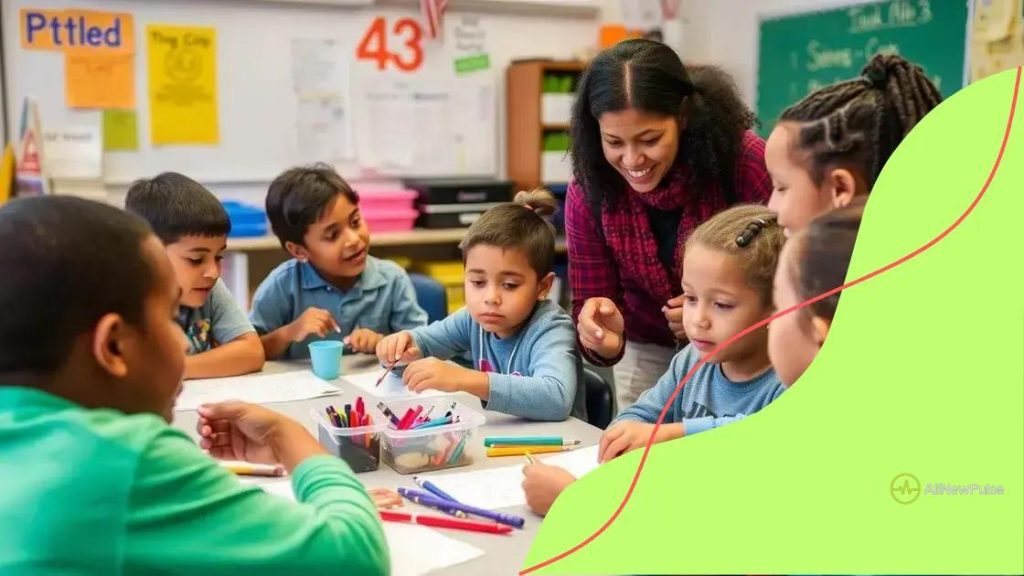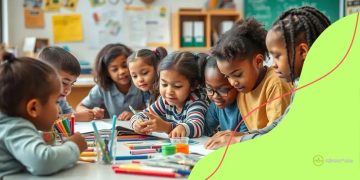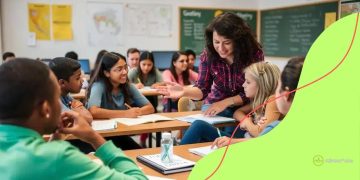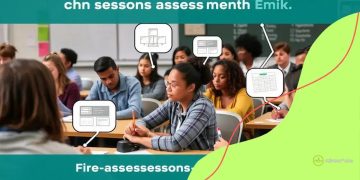Support strategies for gifted and talented students

Support strategies for gifted and talented students include tailored teaching methods, collaboration with parents and the community, and diverse assessment techniques to meet their unique learning needs and promote their academic and emotional growth.
Support strategies for gifted and talented students play a crucial role in nurturing their abilities. Have you ever wondered how tailored approaches can boost their learning experiences? Let’s explore how to support these exceptional learners effectively.
Understanding the needs of gifted students
Understanding the needs of gifted students is essential for their academic and emotional growth. These students often display advanced abilities and require unique approaches to learning. Addressing their needs can help them reach their full potential.
Gifted students may experience different social and emotional challenges compared to their peers. Recognizing these differences is important for teachers and parents alike. For instance, they might feel isolated due to their advanced abilities or struggle with perfectionism. Creating a supportive atmosphere enables them to thrive both academically and socially.
Common characteristics of gifted students
Gifted students often show distinct traits that set them apart. Here are some common characteristics you might observe:
- Advanced problem-solving skills: They can think critically and solve complex issues quicker than their peers.
- Curiosity: Gifted students tend to ask profound questions and seek deep understanding.
- Intense focus: They may dive deeply into subjects they are passionate about.
- Rapid learning: These students can grasp new concepts with ease and often retain information better.
To effectively support these learners, educators need to tailor their teaching methods. Providing challenging materials can keep them engaged. Differentiated instruction helps to meet their diverse learning needs. However, it’s also crucial to foster emotional intelligence. By teaching them how to handle feelings and social interactions, we empower them to navigate their unique challenges.
Another aspect to consider is the role of parents. Collaboration between educators and families can create a network of support for gifted students. Parents can provide insights into their child’s interests and behaviors, which can inform teaching strategies. Open communication between home and school ensures that the child receives consistent support.
Effective teaching methods for high achievers
Effective teaching methods for high achievers are essential in fostering their academic success and engagement. These students thrive in environments that challenge them and allow them to explore their interests deeply. In this context, it’s important to implement a variety of strategies that cater specifically to their unique needs.
One method to consider is differentiated instruction. By tailoring lesson plans to individual learning styles, teachers can ensure that high achievers are both challenged and supported. This approach allows them to explore subjects at a much deeper level than standard curricula offer.
Incorporating project-based learning
Project-based learning encourages students to engage with real-world problems. This strategy not only enhances critical thinking skills but also makes learning relevant. Here are some benefits of this approach:
- Encourages creativity: Students can approach problems in innovative ways.
- Promotes collaboration: Working in teams helps them develop social skills.
- Enhances self-directed learning: Students can take charge of their education.
Another effective teaching method involves the use of advanced materials. Offering resources that go beyond the standard curriculum helps maintain their interest and motivation. Instead of following traditional textbooks, educators can provide access to journals, online courses, and specialized workshops.
Furthermore, allowing flexibility in assignments can cater to high achievers’ unique needs. Encouraging them to create their own projects or choose topics they are passionate about helps foster engagement. This not only makes learning enjoyable but also gives them a sense of ownership over their educational journey.
In addition to academic strategies, it’s vital to support their emotional well-being. Providing private time for self-reflection and discussions can significantly enhance their learning experience. Teachers should be open to checking in on their feelings and thoughts about school and their peers.
Creating a supportive learning environment

Creating a supportive learning environment is essential for gifted students to thrive academically and socially. When students feel safe and valued, they are more likely to engage deeply with their learning. This type of environment fosters both intellectual and emotional development.
One key aspect of a supportive environment is positive reinforcement. Teachers should celebrate students’ achievements, no matter how small. This encouragement helps build self-esteem and motivates them to continue striving for excellence.
Establishing emotional safety
Emotional safety is vital in classrooms. Students must feel comfortable sharing their thoughts without fear of judgment. Here are some strategies to enhance emotional safety:
- Encouraging open communication: Create opportunities for students to express their feelings and ideas freely.
- Building strong relationships: Take time to know each student personally to foster trust.
- Promoting inclusivity: Celebrate diversity and ensure every student feels valued.
Another strategy involves fostering collaborative learning. Group work and peer interactions can enhance understanding and creativity. Through collaboration, students learn to value different perspectives and ideas. This method not only enriches their learning experience but also develops team skills.
Additionally, a classroom should be filled with enriching resources. Providing access to books, technology, and hands-on materials can stimulate curiosity and exploration. Offering a variety of resources helps engage different learning styles and keeps students interested.
Moreover, allowing for flexibility in how students learn is crucial. High achievers often benefit from the autonomy to choose their projects or methods of study. This approach not only respects their individuality but also promotes self-directed learning.
Collaboration with parents and community
Collaboration with parents and the community plays a pivotal role in supporting gifted students. When families and educators work together, they can create a nurturing environment that enhances children’s learning experiences. This partnership fosters stronger relationships and builds a support network that benefits the students.
One of the first steps in fostering collaboration is to engage parents in the educational process. Open lines of communication help parents understand the unique needs of their gifted children. Regular updates such as newsletters or meetings can inform them about their child’s progress and ways they can contribute.
Building strong relationships
Establishing strong relationships between teachers and parents is essential. Here are some effective strategies:
- Regular communication: Use emails, phone calls, or parent-teacher conferences to discuss student developments.
- Invite parents into the learning process: Encourage them to share their skills or knowledge during class activities.
- Provide resources: Share valuable books and articles on gifted education to help parents support their children at home.
Engaging the local community can also be beneficial. Partnerships with community organizations can lead to valuable resources for gifted students. For example, local museums or science centers often offer programs that align with the interests and talents of high achievers. Exposure to these resources broadens their learning opportunities and inspires creativity.
Furthermore, inviting community members into the classroom can enrich the educational experience. Guest speakers, workshops, and field trips can provide real-world context for learning. This helps students see the relevance of their education and how it connects to the world outside school.
Finally, schools can organize events that promote collaboration among families. Activities like talent shows or family nights encourage parents to become actively involved. These events not only strengthen the school community but also celebrate the diversity and talents of gifted students.
Assessment and evaluation strategies
Assessment and evaluation strategies are crucial for understanding the progress of gifted students. Traditional methods may not fully capture their abilities or potential. Therefore, adopting varied assessment techniques can provide a more comprehensive picture of their learning.
One effective method is using alternative assessments. Instead of relying solely on tests, consider using projects, presentations, or portfolios. These forms of assessment allow students to demonstrate their understanding in different ways. They also encourage creativity and critical thinking.
Formative assessments
Incorporating formative assessments helps track students’ progress over time. These assessments can be informal and ongoing, providing immediate feedback. Here are some types:
- Quizzes: Short quizzes can help gauge understanding of material covered.
- Exit tickets: Students write a brief response to a question at the end of a lesson.
- Peer assessments: Allowing students to evaluate one another fosters collaboration.
Another valuable strategy is conducting self-assessments. Encouraging students to reflect on their learning promotes self-awareness. They can evaluate their strengths and areas for improvement. This practice helps them become more independent learners.
Additionally, utilizing standardized tests can provide insights into students’ capabilities. While they shouldn’t be the only measure, they offer benchmarks to compare against. However, it’s important to interpret these results carefully, as they may not reflect the full scope of a gifted student’s abilities.
Lastly, regular communication with parents about their child’s achievements is vital. Sharing assessment results and discussing strategies can help families support their children’s learning at home. This partnership creates a stronger support system that benefits the student.
FAQ – Frequently Asked Questions about Supporting Gifted Students
What are some key characteristics of gifted students?
Gifted students often show advanced problem-solving skills, high levels of curiosity, intense focus on subjects they enjoy, and rapid learning abilities.
How can teachers effectively assess gifted students?
Teachers should use a variety of assessment methods, including projects, portfolios, self-assessments, and formative assessments to gain a comprehensive understanding of each student’s abilities.
What role do parents play in supporting gifted students?
Parents can actively support gifted students by communicating with teachers, providing resources at home, and encouraging their interests to foster a rich learning environment.
Why is collaboration with the community important?
Collaboration with the community allows schools to access additional resources, experiences, and opportunities for gifted students, broadening their learning experiences and engagement.





